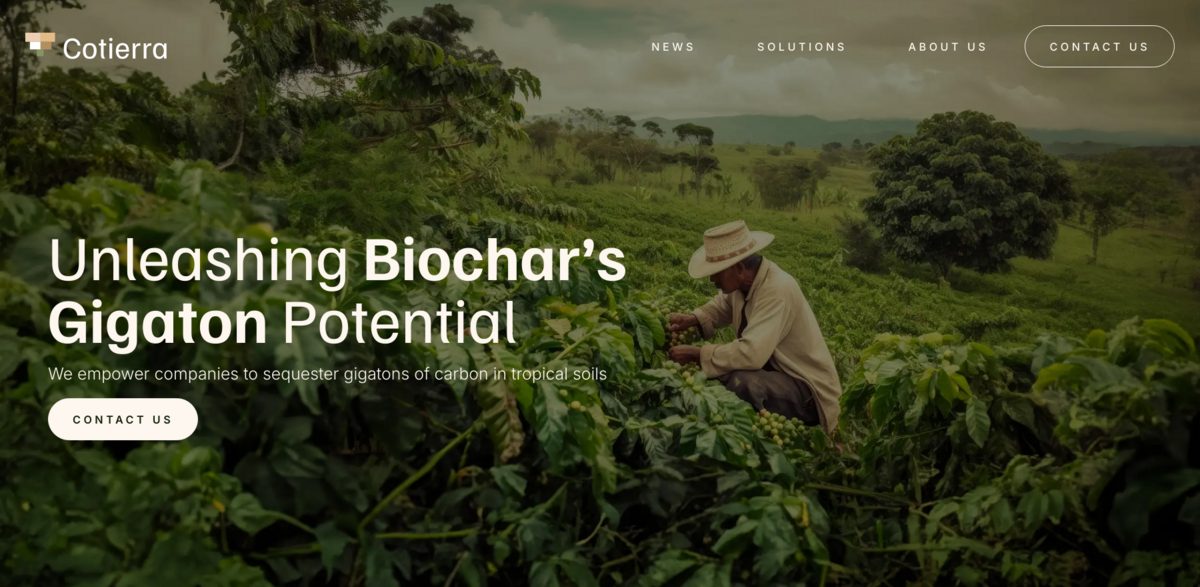What is Cotierra’s Climate Resilient Farming Project?
Cotierra is revolutionizing the way food and beverage companies approach regenerative agriculture. At its core, the project focuses on scalable, trusted, and data-driven biochar infrastructure that transforms agricultural residues into biochar. This process permanently stores carbon in soils and reduces on-farm emissions across global value chains. The initiative is especially impactful in the coffee and cacao sectors, where decentralized biochar production not only cuts farm emissions in half but also boosts farmers’ profit margins by 30%. It’s all about decarbonizing agricultural supply chains while enhancing soil health and climate resilience.
Main Benefits of Cotierra’s Biochar Solution
Here’s a quick snapshot of the key figures and facts that make this project stand out:
- Reduces fertilizer reliance significantly by improving soil health.
- Sequesters carbon permanently in the soil, locking away emissions.
- Boosts farmer profit margins by up to 30%, supporting livelihoods.
- Halves farm emissions in coffee and cacao supply chains.
- Uses IoT-enabled MRV systems for tamper-proof, real-time data on carbon removal.
- Collaborates with agronomists and universities to ensure proper biochar application.
- Verification process validated by Carbon Standards International for trusted emission data.
How Cotierra Produces Biochar Efficiently and Cleanly
The heart of Cotierra’s approach lies in its unique biochar reactor. This innovative technology converts coffee residues directly on farms into premium biochar. Not only does this recycle waste, but it also enhances soil health and locks away carbon permanently. The decentralized nature of the production means it can be scaled globally, empowering smallholder farmers and creating a more resilient agricultural supply chain. Plus, it’s a clean process that supports sustainability from start to finish.
Supporting Farmers with Agronomic Expertise
It’s not just about producing biochar; Cotierra ensures it’s applied correctly. Working hand-in-hand with agronomists and universities, the project teaches farmers the best practices for biochar application. This knowledge transfer leads to reduced fertilizer use, increased crop yields, and stronger, more resilient coffee supply chains. Agronomic studies back these results, showing significant emission reductions and healthier soils. It’s a win-win for farmers and the environment alike.
Transparent Monitoring and Verification
Transparency is key to building trust in carbon removal projects. Cotierra uses IoT technology and a digital app to track biochar production and application with precision. This real-time monitoring improves operational efficiency and captures additional emission reductions. On top of that, a thorough verification process ensures the emission reduction data is accurate and reliable. Currently, this process is being validated by Carbon Standards International, adding an extra layer of credibility.
Project Impact on Sustainable Development Goals (SDGs)
- SDG 2: Zero Hunger – by improving soil health and crop yields.
- SDG 8: Decent Work and Economic Growth – by increasing farmer incomes.
- SDG 12: Responsible Consumption and Production – through sustainable biochar use.
- SDG 13: Climate Action – by reducing emissions and sequestering carbon.
- SDG 15: Life on Land – by restoring soil ecosystems and biodiversity.
Decarbonizing Supply Chains and Building Resilience
Cotierra’s project is more than just carbon removal; it’s about building resilient, net-zero supply chains that stand the test of climate change. By empowering sourcing networks with on-farm biochar technology, companies can secure future supply, boost yields, and deliver verifiable emission reductions. This approach unlocks new value for brands ready to transition to regenerative agriculture and tap into growing carbon markets. Ultimately, it’s a powerful way to reduce and remove carbon emissions, restore soils, and improve the climate resilience of smallholder farmers worldwide.


















